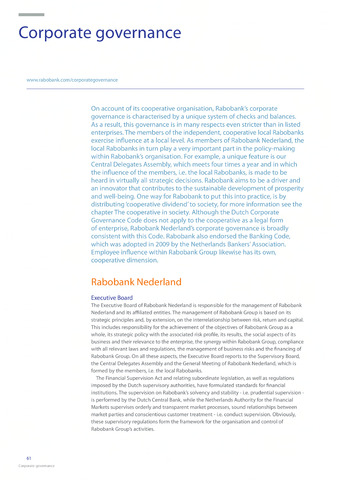Corporate governance
Rabobank Nederland
On account of its cooperative organisation, Rabobank's corporate
governance is characterised by a unique system of checks and balances.
As a result, this governance is in many respects even stricter than in listed
enterprises. The members of the independent, cooperative local Rabobanks
exercise influence at a local level. As members of Rabobank Nederland, the
local Rabobanks in turn play a very important part in the policy-making
within Rabobank's organisation. For example, a unique feature is our
Central Delegates Assembly, which meets four times a year and in which
the influence of the members, i.e. the local Rabobanks, is made to be
heard in virtually all strategic decisions. Rabobank aims to be a driver and
an innovator that contributes to the sustainable development of prosperity
and well-being. One way for Rabobank to put this into practice, is by
distributing 'cooperative dividend'to society, for more information see the
chapter The cooperative in society. Although the Dutch Corporate
Governance Code does not apply to the cooperative as a legal form
of enterprise, Rabobank Nederland's corporate governance is broadly
consistent with this Code. Rabobank also endorsed the Banking Code,
which was adopted in 2009 by the Netherlands Bankers'Association.
Employee influence within Rabobank Group likewise has its own,
cooperative dimension.
www.rabobank.com/corporategovernance
Executive Board
The Executive Board of Rabobank Nederland is responsible for the management of Rabobank
Nederland and its affiliated entities. The management of Rabobank Group is based on its
strategic principles and, by extension, on the interrelationship between risk, return and capital.
This includes responsibility for the achievement of the objectives of Rabobank Group as a
whole, its strategic policy with the associated risk profile, its results, the social aspects of its
business and their relevance to the enterprise, the synergy within Rabobank Group, compliance
with all relevant laws and regulations, the management of business risks and the financing of
Rabobank Group. On all these aspects, the Executive Board reports to the Supervisory Board,
the Central Delegates Assembly and the General Meeting of Rabobank Nederland, which is
formed by the members, i.e. the local Rabobanks.
The Financial Supervision Act and relating subordinate legislation, as well as regulations
imposed by the Dutch supervisory authorities, have formulated standards for financial
institutions. The supervision on Rabobank's solvency and stability - i.e. prudential supervision -
is performed by the Dutch Central Bank, while the Netherlands Authority for the Financial
Markets supervises orderly and transparent market processes, sound relationships between
market parties and conscientious customer treatment - i.e. conduct supervision. Obviously,
these supervisory regulations form the framework for the organisation and control of
Rabobank Group's activities.
61
Corporate governance

